Public Health Preparedness Program
Mission: To prepare and respond to natural and man-made public health emergencies including, but not limited to:
- severe weather conditions
- bioterrorism
- disease outbreaks
- radiological/nuclear hazards

Each month HCHD will bring you information and resources about different hazards and how to be prepared to respond.

Hazard of the Month: Flood Preparedness
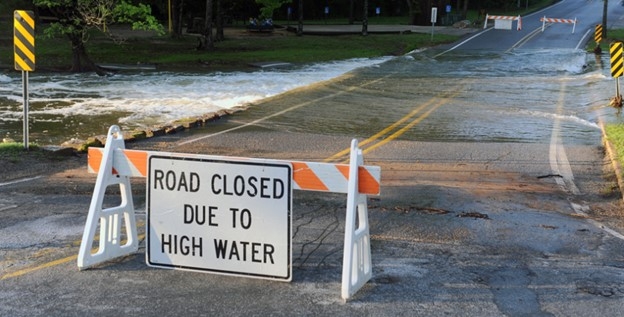
April is Maryland Flood Awareness Month! According to National Oceanic and Atmospheric Administration (NOAA) National Severe Storms Laboratory (NSSL) and stated in the Howard County Flood Mitigation Plan floods are the most common weather-related disaster to occur in the United States and their frequency has increased with changes in the climate. Flash floods are the most dangerous kind due to the combination of power and speed.
The Howard County, Maryland Hazard Identification and Risk Assessment document, affirms Howard County has vulnerabilities to floods; some of the major cities in the County, such as Ellicott City, Elkridge, and the Allview neighborhood in Columbia, are in low-lying areas. Between 2002 and 2022, the National Centers for Environmental Information (NCDC) reports that there were 32 flash flood events. The future annual probability of a Flood is 11-30% + chance of annual occurrence, or one event every 1–9 years.
Howard County, Major Watersheds

Watch Weather Briefly: Flooding on the NOAA Weather Partners YouTube Channel. Learn how you can prepare for, respond to, and recover from flooding events.
Before a Flood
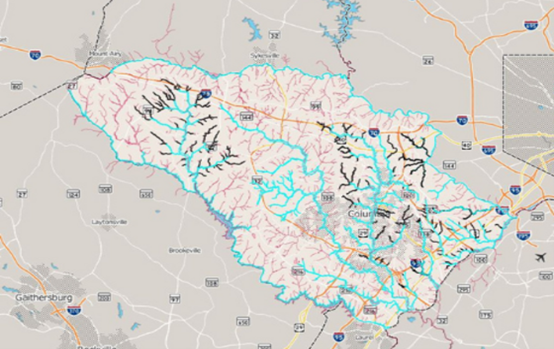
Determine Your Risk:
Howard County has a history of floods, but some areas are at greater risk than others. Most homeowners’ insurance does not cover flood insurance. You can learn about the chances of flooding in your area and how much flood insurance might cost on the Howard County Department of Public Works Flood Insurance Rate Map page.
Howard County Environmental Services staff can be reached with flood-related questions by email DoIFlood@howardcountymd.gov or phone at 410-313-6444. [FT1] [SA2] [FT3]
Click on the National Flood Safe page or call 877-336-2627 to find flood insurance through the National Flood Insurance Program.
Watch the Weather:
• Up-to-date weather information for your area can always be found on the National Weather Service website.
• Keep an eye on social media pages that post weather updates for Howard County and surrounding areas, such as the National Weather Service’s Baltimore-Washington Twitter account. Follow #FloodAwareMD on your favorite social media platforms for flood awareness tips throughout the month of April.
• Learn the difference between a Flood Watch and Flood Warning.
• Write down these local weather radio station frequencies in case you lose electricity and internet.
Make a Plan and Take Preventive Action:
When the chance of flooding is high, here are some steps to help protect your property and valuables:
▪ Keep important documents in a waterproof container.
▪ Create password-protected digital copies.
▪ Protect your property.
▪ Move valuables to a higher level.
▪ Clear exterior drains and gutters of debris.
▪ Install check valves.
▪ Consider a sump pump with a battery.
Watch this video from FEMA about flood preparedness.
During a Flood
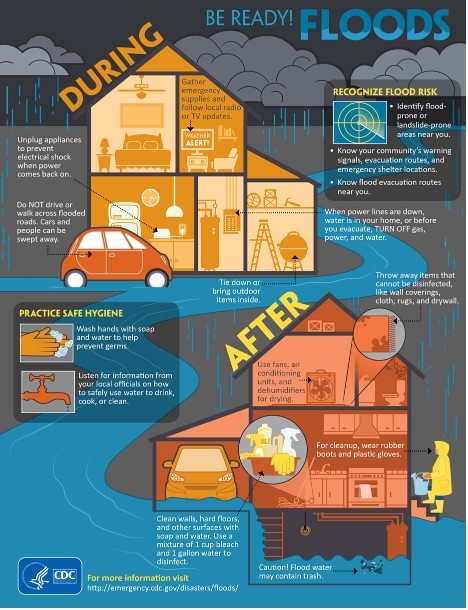
Here are some immediate actions to take during a flood.
Inside your home:
- Stay updated on the flood status by radio, television, and internet.
- Stay out of any room where floodwaters cover electrical cords or outlets.
- Head to upper floors when possible if lower floors become flooded.
- Evacuate immediately if ordered to do so. Turn off utilities and lock the doors as you leave.
In a vehicle:
- Do NOT drive through flooded areas or past barricades—even shallow waters can sweep away your car. Remember: Turn Around, Don’t Drown!
Outside:
- Head for higher ground and shelter immediately.
- Call 911 if you become trapped or believe you are at risk of drowning.
- Avoid contact with floodwaters, which may contain sewage, debris, and other toxins.

After a Flood
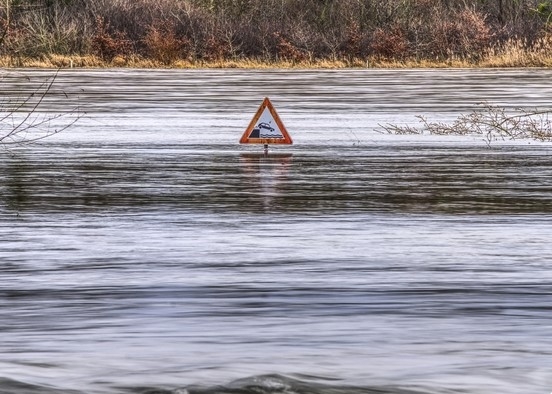
Once floodwater has stopped rising, keep yourself safe:
- Monitor the radio, television, and internet to determine whether/when it is safe to return to or leave your home.
- Continue to avoid contact with floodwater.
- Stay off the roads as much as possible, even if water has receded.
- Check on family members and friends to ensure that they are safe.
If you are returning to your home after evacuating:
- Turn off your electricity and other utilities (if they weren’t already).
- Continue monitoring radio, television, and social media for government assistance information programs.
- Contact your insurance agent/company.
Flood Resources
View the following resources to learn about receiving assistance, repairing your home, and salvaging belongings:
- FEMA, Starting Your Recovery After a Flood
- American Red Cross, Flood Relief
- Howard County Health Department
- “Returning After a Flood”
- “Food Safety After a Power Outage or Flood”
- “Cleaning Mold and Mildew”
- Howard County Public Works, “Flood Protection”
- Howard County Office of Emergency Management “2024-2029 HC Natural Hazard Mitigation Plan”
- YouTube video from The Weather Channel: Fighting the Floods: Ellicott City
Be Prepared
Additional Resources
Heat/Sun Safety Tips
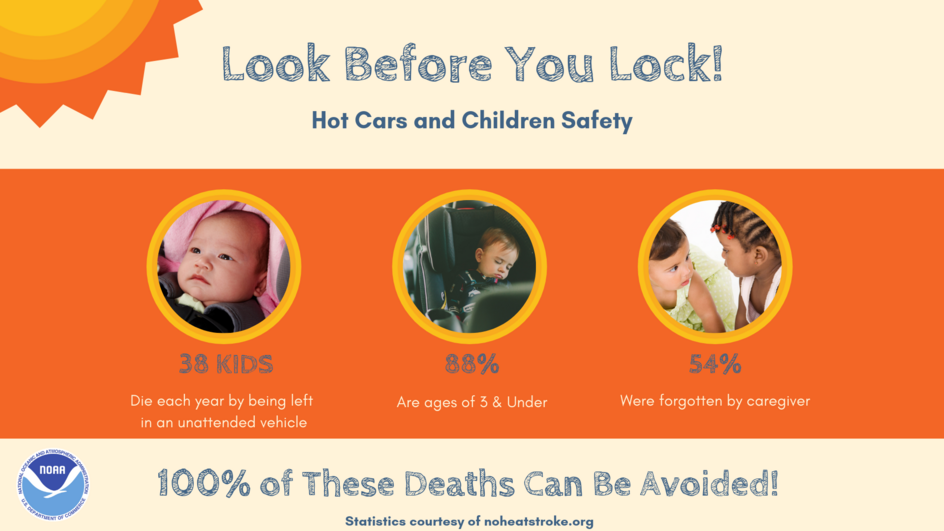
Extreme heat can be dangerous after long periods of exposure, if proper precautions are not taken.
To protect yourself and your loved ones from the dangers posed by prolonged sun and heat exposure, follow the below tips:
- NEVER leave children or pets unattended in a parked car or other hot environment.
- If you must be outside in the heat, wear light-colored, lightweight, loose-fitting clothing, a hat and sunscreen.
- Stay hydrated. Drink water and caffeine-free liquids. Alcoholic beverages do not keep you hydrated.
- Take frequent rest breaks in air-conditioned or shaded areas if you must work or exercise outdoors. If possible, stay out of the sun during the middle of the day.
- Know the signs of heat-related illness, including: extreme weakness, muscle cramps, nausea, headache, vomiting, fainting, dry/red skin.
- Check regularly on infants, elderly, family and neighbors with health conditions as they are more vulnerable to heat-related illness.
- If planning a trip to the lake/beach/pool to cool off, be sure to review swim and water safety guidelines with your family and children
Additional Resources about Heat/Sun Safety:
- NHTSA Prevent Hot Car Deaths
- CDC Sun Safety
- American Academy of Pediatrics Drowning Prevention
- National Weather Service Heat Safety
- Heat.gov
Places to cool off on a hot day (contact location to verify operating hours before visiting)
- Howard County Library System Branches
- Howard County 50+ Centers
- Howard County Recreation & Parks Community Centers
- The Mall in Columbia
Anyone in need of shelter or other assistance should call the Grassroots hotline at 410-531-6677 or visit grassrootscrisis.org.
Maryland Responds Medical Reserve Corps

How can YOU help in an emergency?
Become a Howard County Medical Reserve Corps Volunteer
The Howard County Medical Reserve Corps (HCMRC) Program is volunteer organization created in July 2002. Medical Reserve Corps (MRC) volunteers can be medical and public health professionals or community members with no healthcare background.
This organization prepares for and responds to extreme weather conditions, such as hurricanes, blizzards, and floods, as well as other emergencies affecting public health, such as disease outbreaks.
The MRC also plans community health activities that promote healthy habits.
For more information or questions, contact Randell Young at 410-313-7237 or via email.
Request MRC Volunteers for your organization's public health event
Howard County MRC volunteers may be able to assist your organization with an upcoming event. Complete this request form to let us know what your needs are and you will receive a response within 72 hours from our team with the next steps. Submissions must be completed at least 2 weeks before the event. Questions should be emailed to hocomrc@howardcountymd.gov.
Criteria to qualify for MRC assistance:
- The requesting agency provides a service which promotes or supports public health initiatives in Howard County.
- The event for which assistance is being sought does not conflict with other planned HCMRC activities.
- The requesting agency’s mission may not conflict with the mission of the HCHD, or the HC MRC.
Examples of Public Health Initiatives:
- Health Fairs
- School-based flu vaccinations
- Outreach initiatives
- Community education
At A Glance Emergency Contact Information
Howard County Health Department
Phone: 410-313-6300
Maryland Department of Health (MDH)
Phone: 410-767-6500
After Hours Emergency: 410-795-7365
Maryland Emergency Management Agency (MEMA)
Phone: 410-517-3600
Centers for Disease Control and Prevention (CDC)
Phone: 800-232-4636
Hazards of the Month
January Hazard: New Year, New Year, Take Action and Prepare
February Hazard: Power Outage Safety
April Hazard: Flood Preparedness
June Hazard: Thunder, Lightning, Hurricanes, & Tornadoes
August Hazard: Back to School Preparedness
September Hazard: Personal & Home Preparedness
October Hazard: Outdoor Awareness
November Hazard: Nuclear & Radiological Preparedness
December Hazard: Winter Weather Preparedness